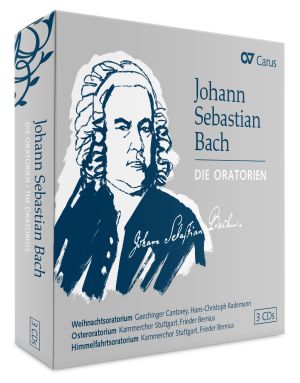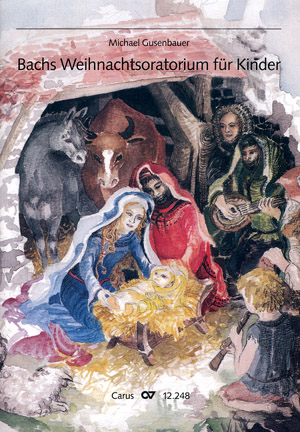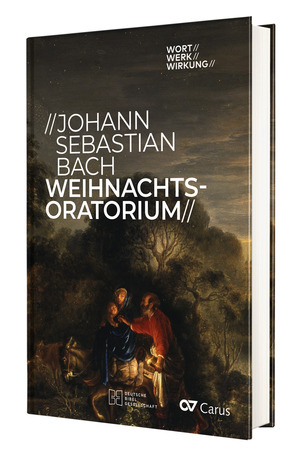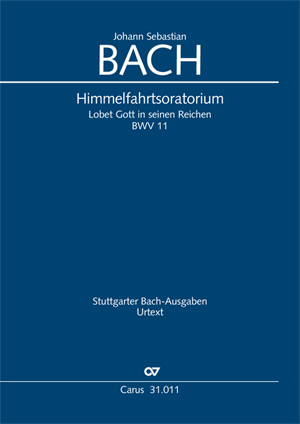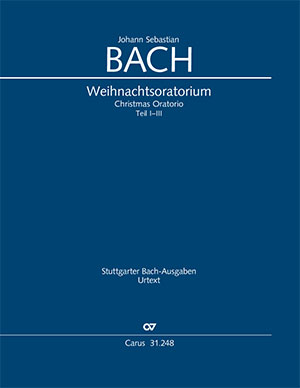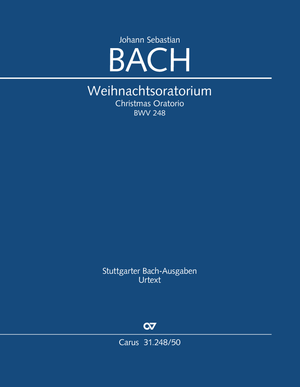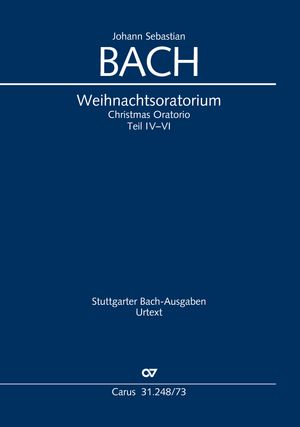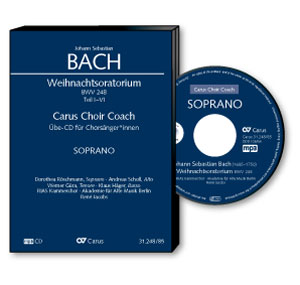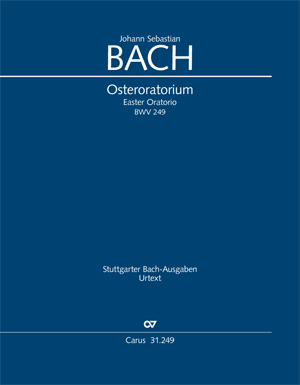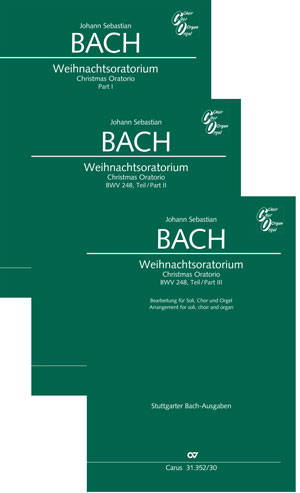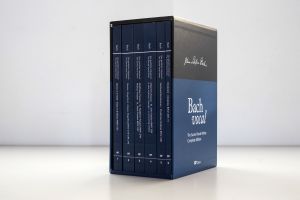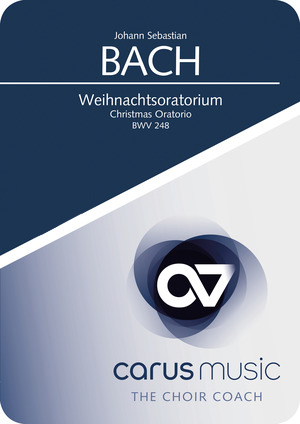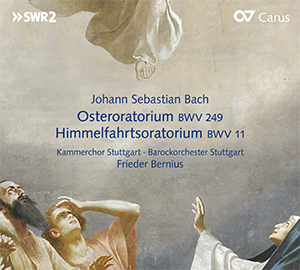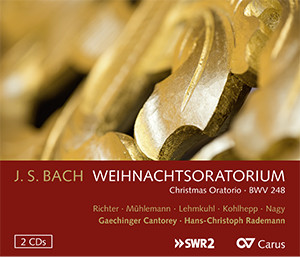The Oratorios
Ascencion Oratorio, Easter Oratorio, Christmas Oratorio
Bach’s Easter Oratorio, like the Ascension Oratorio, is – unjustly – somewhat overshadowed by the Christmas Oratorio. Like the latter, the other two oratorios derive from occasional compositions by Bach, which Bach thereby made generally usable. Bach apparently held the Easter Oratorio in particularly high esteem and performed it again several times, as evidenced by minor changes to the composition. The representative Ascension Oratorio “Lobet Gott in seinen Reichen” (“Praise God in His Realms”), with its festive structure and instrumentation, reflects the triumphant joy of Christ’s Ascension especially in the opening and closing choruses. With the present recording of the highest calibre by the Stuttgart Chamber Choir, the Stuttgart Baroque Orchestra, and outstanding soloists under the direction of Frieder Bernius, it is clear that both works are truly masterful compositions that need not take a back seat musically to the Christmas Oratorio.
Originally composed for the Christmas season of 1734/35, the Christmas Oratorio has become as much a part of Christmas as Christstollen and Spekulatius (German Christmas patries). Also in this work, the parody templates can be discerned throughout. For example, the famous timpani strokes at the beginning of the chorus “Jauchzet, frohlocket” derive from the cantata Tönet, ihr Pauken! Erschallet, Trompeten BWV 214. Under the artistic direction of Hans-Christoph Rademann, the choir and ensemble of the Gaechinger Cantorey accompanied by an outstanding quintet of soloists perform Bach’s most famous oratorio. As a bonus track, the original version of the 1st chorus can also be heard, performed by the same ensemble.
-
Compositeur
Johann Sebastian Bach
| 1685-1750Jean Sébastien Bach compte parmi les compositeurs essentiels de l'histoire de la musique occidentale. Il faisait partie d'une grande dynastie de musiciens, dont furent originaires nombre de musiciens municipaux et d'organistes dans les régions de Thuringe et de Saxe.
Bach vocal
Depuis la fondation des Éditions Carus en 1972, la publication des oeuvres de Johann Sebastian Bach revêt une importance particulière. En 2017, année du 500e anniversaire de la Réforme, nous avons clôturé le projet Bach vocal. L'intégralité de la musique vocale sacrée de Bach est désormais disponible en éditions modernes des textes originaux, matériel d'exécution compris. Une édition globale de toutes les partitions dans un coffret de grande qualité est aussi proposée. Plus d'information sur la personne
-
L'auteur de l'avant-propos
Ulrich Leisinger
-
L'auteur de l'avant-propos
Meinrad Walter
| 1959Meinrad Walter ist ein ausgewiesener Kenner im interdisziplinären Gespräch zwischen Musik und Theologie. Er promovierte über Johann Sebastian Bachs geistliche Vokalmusik und war anschließend in Wissenschaft, Journalismus, Musikmanagement und Verlagswesen tätig. Seit 2002 ist er Kirchenmusikreferent der Erzdiözese Freiburg, seit 2008 Lehrbeauftragter für Theologie und Liturgik an der Freiburger Musikhochschule. Er ist Mitherausgeber der Zeitschriften Musik und Kirche und Musica Sacra, publiziert in Fachblättern und ist durch Radiosendungen, Vorträge und Workshops einem breiten Publikum bekannt. Plus d'information sur la personne
-
Chœur
Kammerchor Stuttgart
The Kammerchor Stuttgart is regarded as one of the best ensembles of its kind. Over its fifty-year existence, Frieder Bernius has developed the choir into an exceptional ensemble acclaimed by audiences and press alike. This has led to invitations for the choir to perform at all the important European festivals. In Germany the chamber choir performs at festivals and in concert halls in repertoire ranging from the 17th to the 21st century. Frieder Bernius and his ensemble have received numerous accolades for their contribution to new music. The Kammerchor Stuttgart has made over 80 CDs and LPs, numerous of which have been awarded international recording prizes (including the Edison award, Diapason d’or, Gramophone Choice, Classical Internet Award, International Classical Music Award, and German Record Critics’ Award prizes). The International Federation for Choral Music has invited the ensemble to sing at the 1st, 4th and 10th World Symposia on Choral Music in Vienna, Sydney and Seoul. Regular tours of North America and Asia since 1988 and a South America tour reflect the Kammerchor Stuttgart’s international reputation. Since 1984 the top ensemble has also been invited to Israel biennially. Plus d'information sur la personne
-
Ensemble
Gaechinger Cantorey
The Gaechinger Cantorey is the ensemble of the International Bach Academy Stuttgart. It combines a Baroque orchestra and a hand-picked choir to form a finely tuned early music ensemble. Under the baton of academy director Hans-Christoph Rademann, this ensemble is dedicated to the international dissemination of a “Stuttgart Bach style.” Since its re-establishment as the Gaechinger Cantorey in 2016, the ensemble of the International Bach Academy has gained renown with numerous performances in Germany, such as at the Musikfest Stuttgart, the Bachwoche Ansbach, the Bachfest Leipzig, the Rheingau Music Festival, the Festspielhaus Baden-Baden, the Dresden Kulturpalast, and the Hamburg Elbphilharmonie, as well as abroad at the Théâtre des Champs-Élysées in Paris, in the USA (Fort Lauderdale, Chapel Hill, Norfolk, Princeton, Los Angeles, Irvine, Williamsburg), in Canada (Montréal), and in South America (São Paulo, Rio de Janeiro, Buenos Aires, Lima, Santiago de Chile, Bogotá). In addition, the Gaechinger Cantorey with its director Hans-Christoph Rademann pursues a busy recording schedule. On the Stuttgart label Carus and on accentus music, the ensemble has recorded the Christmas Oratorio, cantatas and the two Passions by J.S. Bach, Handel’s Messiah, Haydn’s Creation and other works. Digital podcasts and concert streams with the Gaechinger Cantorey are also available in the Bach Academy’s media library. From May 2023 to June 2024, the Gaechinger Cantorey, under the direction of Hans-Christoph Rademann, will perform all J.S. Bach’s cantatas from his first year as Kantor at St. Thomas’s Church in Leipzig – exactly 300 years after the historic event in 1723/1724. CD recordings of all the concerts in churches and concert halls in Stuttgart and the surrounding area will be released by Hänssler Classic. The Gaechinger Cantorey regularly and enthusiastically participates in the various music education formats of the International Bach Academy under the motto “BachBewegt!,” in which children and young people are actively invited to sing, dance and experience music on stage or as listeners in the concert hall. These include family concerts, joint performances and danced interpretations of important masterpieces of the oratorio literature. Plus d'information sur la personne
-
Orchestre
Barockorchester Stuttgart
The Barockorchester Stuttgart, which was founded by Bernius in 1985, specializes in 18th century music. The musicians are among the leading representatives of historical performance practice and perform exclusively on original instruments. The ensemble dedicates itself to a large extent to the revival of 18th century operas. It has performed at numerous international festivals, among others in Rome, Dresden and Göttingen. Plus d'information sur la personne
-
Chef d'orchestre
Frieder Bernius
| 1947Frieder Bernius’s work has earned great worldwide recognition. He is in demand internationally as a conductor and as a teacher. His principal artistic collaborators are the ensembles he founded himself, the Kammerchor Stuttgart, the Barockorchester Stuttgart, the Hofkapelle Stuttgart and the Klassische Philharmonie Stuttgart. As a guest conductor, he has collaborated repeatedly with, for example, the SWR Vokalensemble Stuttgart, the Deutsche Kammerphilharmonie Bremen, the Stuttgarter Kammerorchester and the Streicherakademie Bozen. Great stylistic versatility is Frieder Bernius’s hallmark. Whether he conducts vocal works by Monteverdi, Bach, Händel, Mozart, Beethoven, Fauré and Ligeti, stage music by Mendelssohn or symphonies by Haydn, Burgmüller and Schubert, his work always aims for a sound that is at once unmistakably personal and at the same time oriented towards the original period sound ideal. He devotes himself equally to the rediscovery of 18th century operas and to first performances of contemporary compositions. He is particularly interested in the musical history of southwestern Germany. Carus-Verlag has awarded Frieder Bernius a Golden CD for his complete recording of the sacred music of Felix Mendelssohn Bartholdy. The award was presented to him during the German Choir Festival in Stuttgart 2016. The sale of over 250,000 recordings, which has been acclaimed with a number of awards, has made a not insignificant contribution to what today is the obvious presence of Mendelssohn's complete œuvre in the concert repertoire. Plus d'information sur la personne
-
Chef d'orchestre
Hans-Christoph Rademann
| 1965Conductor Hans-Christoph Rademann is an immensely versatile artist with a broad repertoire who devotes himself with equal passion and expertise both to the performance and rediscovery of early music and to the first performances and cultivation of Contemporary Music. Born in Dresden and raised in the Erzgebirge mountains, he was influenced at an early age by the great Central German kantorial and musical tradition. He was a student at the traditional Kreuzgymnasium, a member of the famous Kreuzchor, and studied choral and orchestral conducting at the Carl Maria von Weber University of Music in Dresden. During his studies, he founded the Dresdner Kammerchor and formed it into a top international choir which is still under his direction today. Since 2013, Hans-Christoph Rademann has been the academy director of the International Bach Academy Stuttgart. He regularly collaborates with leading choirs and ensembles of the international music scene. From 1999 to 2004 he was chief conductor of the NDR Choir and from 2007 to 2015 chief conductor of the RIAS Chamber Choir. Guest conducting engagements have led and continue to lead him to the Nederlandse Bachvereniging, the Collegium Vocale Gent, the Akademie für Alte Musik, the Freiburger Barockorchester, the Deutsche Radiophilharmonie Saarbrücken Kaiserslautern, the Sinfonieorchester Basel, the Orchestre Philharmonique de Luxembourg, among others. Hans-Christoph Rademann has been awarded prizes and honors for his artistic work, including the Johann Walter Plaque of the Saxon Music Council (2014), the Saxon Constitutional Medal (2008), the Sponsorship Prize as well as the Art Prize of the state capital Dresden (1994 and 2014 respectively). He received the Preis der Deutschen Schallplattenkritik several times for his numerous CD recordings (most recently in 2016), as well as the Grand Prix du Disque (2002), the Diapason d’Or (2006 & 2011), the CHOC de l’année 2011 and the Best Baroque Vocal Award 2014. In 2016 he was awarded the European Church Music Prize of the city of Schwäbisch Gmünd. His exemplary interpretation and recording of the complete works of Heinrich Schütz with the Dresdner Kammerchor in the Stuttgart Carus-Verlag, which was completed in 2019, was awarded the newly endowed Heinrich Schütz Prize as well as the OPUS KLASSIK 2020 in the same year. Hans-Christoph Rademann is professor of choral conducting at the Carl Maria von Weber University of Music in Dresden. He is also artistic director of the Musikfest Erzgebirge, ambassador of the Erzgebirge and patron of the Christian Hospice Service Dresden. Plus d'information sur la personne
-
Solist - soprano
Regula Mühlemann
-
Solist - soprano
Joanne Lunn
Joanne Lunn, soprano, studied at the Royal College of Music in London, where she won the renowned Tagore Gold Medal. She regularly concertizes as a soloist with all the renowned early music ensembles. She gave her opera debut at the English National Opera in Monteverdi’s L’incoronazione di Poppea and sang the role of Helena in Britten’s A Midsummer Night’s Dream in Venice, as well as singing in Monteverdi’s L’Orfeo in Paris and Beijing. In the field of oratorio, Joanne Lunn has worked together with conductors such as Bernius, Minkowski, Norrington and Suzuki. Plus d'information sur la personne
-
Solist - soprano
Anna Lucia Richter
-
Solist - alto
Elisabeth Jansson
The Swedish mezzo-soprano Elisabeth Jansson, born 1976, studied at the Richard Strauss Konservatorium in Munich, the Royal Academy of Music in London and the Royal Opera Academy, Copenhagen. She was engaged for principal roles in various opera productions – from 2007 to 2009 she held a soloist ensemble position at The Royal Opera, Copenhagen. Elisabeth Jansson is a much sought after concert singer and has appeared in concerts and at renowned festivals throughout Europe. (BWV 249) Plus d'information sur la personne
-
Solist - alto
Wiebke Lehmkuhl
-
Solist - alto
David Allsopp
-
Solist - ténor
Sebastian Kohlhepp
-
Solist - ténor
Jan Kobow
-
Solist - ténor
Samuel Boden
The tenor Samuel Boden studied at Trinity College of Music in London with John Wakefield and graduated with distinction in 2006. His repertoire is very broad and includes operas and oratorios ranging from the Baroque to the modern period. His concert repertoire includes, among others, works by Bach, Mozart, Britten and Charpentier. CD recordings of Monteverdi's "Vespers 1610" with the Orchestra of the Age of Enlightenment, cantatas by Pachelbel und Bach, as well as Bach's "B Minor Mass" document his predilection for Baroque music. Plus d'information sur la personne
-
Solist - basse
Gotthold Schwarz
Gotthold Schwarz a accompli sa formation musicale initiale à l’École de musique d’église de Dresde et au Conservatoire de musique Felix Mendelssohn Bartholdy de Leipzig. La basse a étudié le chant auprès de Gerda Schriever et la direction auprès de Max Pommer et Hans-Joachim Rotzsch. Il travaille régulièrement avec des artistes et ensembles renommés dans toute l’Europe, citons entre autres Frieder Bernius, Peter Schreier et Philippe Herreweghe. En dehors de son importante activité de concert, e. a. aux États-Unis, il a donné des cours d’interprétation sur des œuvres de Bach. Nombre de productions pour le CD et la radio documentent son vaste répertoire, qui embrasse, en dehors de la littérature de concert et d’opéra, également le lied de l’époque baroque à nos jours. Plus d'information sur la personne
-
Solist - basse
Tobias Berndt
Tobias Berndt began his musical education in the Dresden Kreuzchor. He studied with Christian Polster in Leipzig and continued his training with Rudolf Piernay in Mannheim. He also studied with Dietrich Fischer-Dieskau and Thomas Quasthoff. He was a laureate in numerous renowned singing competitions, winning – among others – the International Das Lied Competition in Berlin, the International Brahms Competition and the Cantilena Singing Competition. Tobias Berndt has also established himself abroad as an opera and concert singer. He has collaborated with conductors such as Philippe Herreweghe, Helmuth Rilling, Frieder Bernius, Teodor Currentzis, Marcus Creed, Hans-Christoph Rademann, Andrea Marcon, Marek Janowski and Sir Roger Norrington and has performed at the Berliner Philharmonie, the Tonhalle in Zurich, the Concertgebouw Amsterdam, the Leipzig Gewandhaus, the Tchaikovsky Concert Hall in Moscow, the Teatro Colon in Buenos Aires and at Lincoln Center in New York. He has also performed at important festivals such as the Prague Spring, the Rheingau Musik Festival, the Händel Festivals in Göttingen und Halle, the Bachfest Leipzig, the Oregon Bach Festival and the International Music Festival in Peking. An extensive discography attests to his versatile artistic activities. Plus d'information sur la personne
-
Solist - basse
Michael Nagy
Questions fréquentes sur l'œuvre
 Il n'y a pas encore de questions et réponses concernant cette œuvre ou vous n'avez pas trouvé la réponse à votre question sur l'œuvre ? Cliquez ici et envoyez votre question spécifique à notre service clients.
Il n'y a pas encore de questions et réponses concernant cette œuvre ou vous n'avez pas trouvé la réponse à votre question sur l'œuvre ? Cliquez ici et envoyez votre question spécifique à notre service clients.


